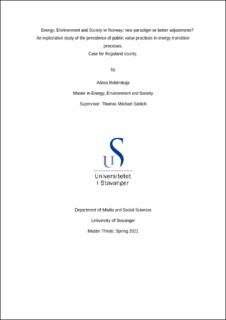| dc.description.abstract | The sustainability paradigm is widely researched on the international and national level; however, the local level should not be left behind. The emphasis of this thesis is placed on sustainable development on the local level. It investigates progress towards sustainability across Rogaland’s 23 municipalities. Goal of the thesis is to exemplify if there is an association between financial (budgetary) performance and sustainability. In addition to financial performance, ‘culture’ is being assessed as a factor that might explain difficulties that are imperative to overcome for achieving a more sustainable Rogaland region. To study this factor, the thesis includes a double case study for Lund and Gjesdal municipalities.
The key question for this Master thesis is: why is the sustainability performance of some municipalities higher than the one of others and what are the main challenges that need to be resolved among municipalities toward successful transition to sustainability for Rogaland region? The findings of this study are consistent with the claims that high financial performance generally led to positive sustainability performance. The municipalities that have articulated social, economic, and environmental dimensions of sustainability tend to perform better, than those that have not emphasized the three pillars of sustainable development. Additionally, low financial performance led to negative sustainability (example of the Lund). After all, it is possible to perform financially well without sustainable practices (extreme case).
The main findings are outlined in three conclusions. Despite municipalities progress in some areas of sustainable development (goal 3, goal 11, goal 17), the other areas are still having not received a major attention (goal 5, goal 14, goal 16). The data also prove that to reach a remarkable performance for Rogaland municipalities in all three sustainability dimensions is not an easy task while simultaneously ensure the financial reward for local authorities. The competition across municipalities at the expense of other value impede a credible sustainability transition. Lund and Gjesdal example show that the cultural aspect (intervening variable), in addition to financial indicators can explain some of the variation of the sustainability performance of municipalities.
Notwithstanding, the gap between economic plans and actual performance across municipalities is evident, triggering the local governments to adopt to constant changes. Municipalities lack the practices and methods and overall framework necessary for policies implementation on the local level. As a result, there is a need to adjust along the way for successful and viable functioning of municipal economies in the long-term perspective. | |
